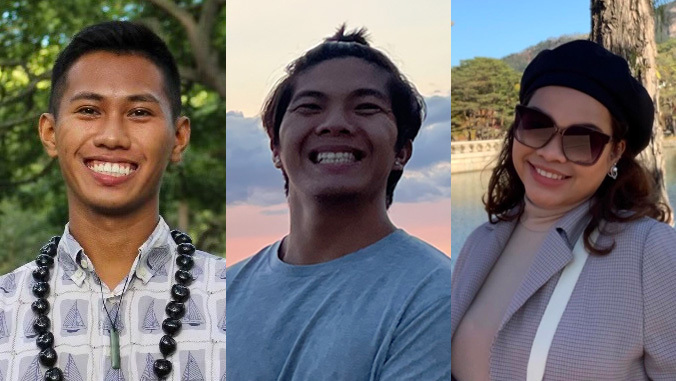
Elarie Ranido knew she wanted a career in a health field, even as a young child. After moving from the Philippines to Hawaiʻi at age 10, she encountered bullying at school because her primary language was Ilokano. That experience encouraged her to help others in the Filipino community who faced language barriers.
Now, the University of Hawaiʻi at Mānoa senior is pursuing a double major in public health and Ilokano.
“There are a lot of health issues in the Filipino community, and I want to use my knowledge of health, as well as Filipino language and culture to make an impact,” Ranido said.
I want to use my knowledge of health, as well as Filipino language and culture to make an impact.
—Elarie Ranido
Other students share the same goal. When Denise Nelson-Hurwitz, the chair of the undergraduate public health program at UH Mānoa in the Thompson School of Social Work & Public Health, looked at her list of students with multiple majors, the most common major students had declared alongside their public health major was Philippine Language and Culture.
“It’s incredibly impressive that these students pursue both of these rigorous programs,” Nelson-Hurwitz said. “The public health workforce in Hawaiʻi benefits enormously from these hardworking and multi-talented students, and our program is proud to empower them with the education and preparations to make an impact in their communities.”
According to Nelson-Hurwitz, recent research has shown, in the time of COVID-19 when racial and ethnic minorities are more likely to become sick or hospitalized, this new workforce who is representative of the increasingly diverse communities they serve is especially critical and having a positive influence.
Helping family members navigate health care
For Ranido, her experiences after moving to Hawaiʻi opened her eyes to the importance of in-language communication. Ranido saw her grandparents’ mistrust of the health care system, and their discomfort when they had to go to a doctor who didn’t speak their language.
Similarly, for Allen Oamil, who is pursuing multiple majors in public health and Filipino, the experience of moving to Hawaiʻi at age 12 and translating for his parents during their many doctor appointments motivated him to work toward promoting healthy lifestyles for Filipino communities.
“I like the idea of promoting interventions to whole communities,” Oamil said.
He spoke Ilokano growing up and is taking Tagalog classes at UH. One of Oamil’s goals is to promote the idea of taking small steps toward better health.
“There are so many things to do—exercise, eat healthy food, manage stress—and in Filipino communities, people have a traditional mindset and think they have to commit to large changes,” he said. “But you don’t have to run a marathon, just go for a walk. Filipino food is fatty and oily, but we can skip the red meat sometimes. I want to promote interventions that are accessible.”
Alumni supporting their communities
Recent graduate Jairah Mae Pascual earned multiple majors in public health and Ilokano, and now works at a startup that identifies health and social service needs of older adults and connects them with resources.
When Pascual moved to Hawaiʻi from the Philippines, she noticed that doctors’ offices and clinics usually provided papers after each appointment that explained medications or gave instructions for follow ups.
“But Filipino culture is very verbal—we like to talk,” Pascual said. “When we’re given a stack of papers to fill out, it can be overwhelming.” One of her goals is to increase the recognition of the importance of providing in-language verbal communication with patients and communities.
Meldrick Ravida recently graduated with his bachelor’s degree in public health and Filipino, and is now pursuing a master of public health at UH Mānoa. Ravida was born and raised in Hawaiʻi, and spoke Ilokano and English at home. While working toward his bachelor’s, he completed an internship at the UH Cancer Center that focused on health in the Filipino, Native Hawaiian, Chinese and Japanese communities.
“My dual major informs the work I do every day,” Ravida said. “At my internship, I learned how to design studies and gather data, but I also understand the social and cultural norms of Filipino communities, so I incorporate my understanding of these norms in my work.”
Ravida and other graduates agree the Office of Public Health Studies program has supported them to achieve their academic goals.
“The public health department really works with you to make it possible to complete both majors,” Ravida said. “It was a great experience.”
This is an example of UH Mānoa’s goal of Enhancing Student Success (PDF), one of four goals identified in the 2015–25 Strategic Plan (PDF), updated in December 2020.

